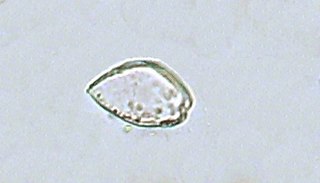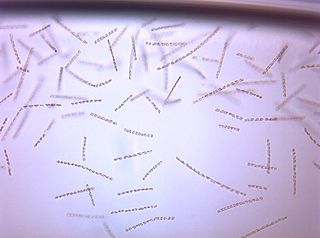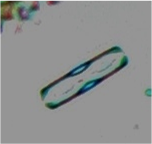
The Prorocentrales are a small order of dinoflagellates. They are distinguished by having their two flagella inserted apically, rather than ventrally as in other groups. One flagellum extends forward and the other circles its base, and there are no flagellar grooves. This arrangement is called desmokont, in contrast to the dinokont arrangement found in other groups. Accordingly, the Prorocentrales may be called desmoflagellates, and in some classifications were treated as a separate class Desmophyceae.

The glaucophytes, also known as glaucocystophytes or glaucocystids, are a small group of unicellular algae found in freshwater and moist terrestrial environments, less common today than they were during the Proterozoic. The stated number of species in the group varies from about 14 to 26. Together with the red algae (Rhodophyta) and the green algae plus land plants, they form the Archaeplastida.
Andrew Jefferson Offutt V was an American science fiction, fantasy, and erotic fiction author. He wrote as Andrew J. Offutt, A. J. Offutt, and Andy Offutt. His normal byline, andrew j. offutt, has all his name in lower-case letters. His erotica appeared under seventeen different pseudonyms, principally John Cleve, John Denis, Jeff Morehead, and Turk Winter.

AlgaeBase is a global species database of information on all groups of algae, both marine and freshwater, as well as sea-grass.

Chaetoceros is a genus of diatoms in the family Chaetocerotaceae, first described by the German naturalist C. G. Ehrenberg in 1844. Species of this genus are mostly found in marine habitats, but a few species exist in freshwater. It is arguably the common and most diverse genus of marine planktonic diatoms, with over 200 accepted species. It is the type genus of its family.

Guiry-en-Vexin is a commune in the Val-d'Oise department in Île-de-France in northern France.

Peridiniales is an order of dinoflagellates.
Craticula is a genus of diatom that lies on or in the top layers of sediments in the freshwater to brackish water environments it inhabits. In addition to frustule morphology the genus differs from closely related species by its sexual reproduction and movement in response to light.

Peridinium is a genus of motile, marine and freshwater dinoflagellates. Their morphology is considered typical of the armoured dinoflagellates, and their form is commonly used in diagrams of a dinoflagellate's structure. Peridinium can range from 30 to 70 μm in diameter, and has very thick thecal plates.

The Rivulariaceae are a family of cyanobacteria within the Nostocales in which the filaments (trichomes) are tapered from wider at the base to narrower at the tip.

Bodonida is an order of kinetoplastid flagellate excavates. It contains the genera Bodo and Rhynchomonas, relatives to the parasitic trypanosomes. This order also contains the colonial genus Cephalothamnium.

The Chlorophytina are a proposed basal Tetraphytina clade. It is currently seen as sister of the Pedinomonadaceae. It contains the more well-known green alga and is characterized by the presence of phycoplasts.

Amphiprora is a genus of diatoms belonging to the family Amphipleuraceae.

Gomphonema is a genus of diatoms belonging to the family Gomphonemataceae.











